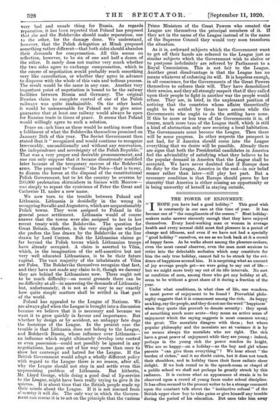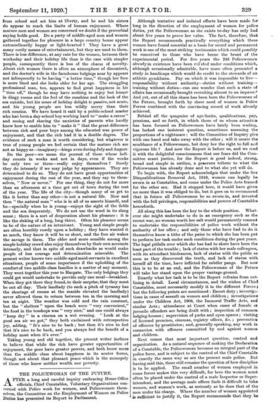THE POWER OF ENJOYMENT.
" IHOPE you have had a good holiday." This good wish is constantly in our ears at this time of year. It has become one of " the compliments of the season." Most holiday- makers make answer sincerely enough that they have enjoyed themselves. Every hard-working man or woman in average health and every normal child must find pleasure in a period of change and idleness, and even if we have not had a specially " good holiday " ourselves, we see as we look back at it a crowd of happy faces. As he walks about among the pleasure-seekers, even the most casual observer, even the man most anxious to retire into the delectable seclusion which may constitute for him the only true holiday, cannot fail to be struck by the evi- dence of happiness around him. It is surprising what an amount of joy average people get—we were going to say out of life— but we might more truly say out of its idle intervals. No sort or condition of men, among those who get any holiday at all, seem to be without a great share of it during a fraction of the year.
Under what conditions, in what class of life, one wonders, is most power of enjoyment to be found ? Proverbial philo- sophy suggests that it is commonest among the rich. As happy as a king, say the people, and they do not use the word " happiness' when they quote this proverb to denote serenity : they speak of something much more acute—they mean an active sense of enjoyment which the saying suggests is most common arconi; the great. The moralists disagree with them ; but where popular philosophy and the moralists are at variance it is by no means always the moralists who are right. The rich have a great power of enjoyment while they are young : indeed, perhaps in the young rich the power reaches its height. Who are so happy—on a holiday—as the boy and girl whose parents " can give them everything" ? We hear about " the burden of riches," and it no doubt exists, but it does not touch their shoulders, and in holiday times their faces radiate sheer delight. If we look round us in the speech-room or chapel of a public school we shall not perhaps be greatly struck by this radiance. It is curious what an appearance of strain is to be observed upon a crowd of young faces under school discipline. It has often seemed to the present writer to be a strange comment upon the constant talk about the " instinctive refusal " of the British upper class boy to take pains or give himself any trouble during the period of his education. But once take him away
from school and set him at liberty, and he and his sisters do appear to reach the limits of human enjoyment. Where mature men and women are concerned we doubt if the proverbial saying holds good. Do a party of middle-aged men and women gathered together for pleasure in a large country house appear extraordinarily happy or light-hearted ? They have a great many costly means of entertainment, but they are used to them. There is less difference, at any rate for the women, between their workaday and their holiday life than is the case with simpler people, consequently there is less of the charm of novelty. About rich women there is often an atmosphere of discontent, and the doctor's wife in the farmhouse lodgings near by appears not infrequently to be having " a better time," though her face is more lined and she looks older for her age. The struggling professional man, too, appears to find great happiness in his " time off," though he may have nothing to enjoy but leisure in dingy rooms and the feel of the sunshine and the look of the sea outside, but his sense of holiday delight is passive, not acute, and his young people are less wildly merry than their rich cousins. We have heard it said by a public-school master who ham been a day-school boy working hard to " make a career" and seeing and sharing the anxieties of parents who hardly knew how to enable him to " make it " that the great difference between rich and poor boys among the educated was power of enjoyment, and that the rich had it in a double degree. The evidence of such a man is worth considering, but whatever is true of young people we feel certain that the mature rich are not as happy as—imaginary--kings even during July and August.
Do the poor—we mean the poorest of those whose holi- day counts in weeks and not in days, even if the weeks be only two or three—really enjoy themselves ? Surely they do intensely if we may judge by appearances. They are determined to do so. They do not have great opportunities of enjoyment during the rest of the year, and they say to them- selves, " Now or never." For one thing, they do not for more than an afternoon at a time get out of town during the rest of the year. The life of the city—though many of us get to like it better than any other—is not a natural life. Now and then " the natural man " who is in all of us asserts himself, and he—specially when he is young—enjoys the sight of the fields and the sea desperately. We do not use the word in its slang sense ; there is a sort of desperation about his pleasure : it is like the slaking of a long, long thirst. Often his pleasure seems to be of the nature of an intoxicant. Young and simple people are often horribly rowdy upon a holiday ; they have wanted it so much, they know it will be so short, and the free air wakes the savage in them. The older and more sensible among the simple holiday crowd also enjoy themselves by their own accounts intensely, and that in spite of such drawbacks as would make people of less courage and determination miserable. The present writer knows two middle-aged maid-servants in excellent situations, people of some importance if the upholding of the comfort of two middle-class families is a matter of any moment. They went together this year to Margate. The only lodgings they could get would undertake to provide only one meal—breakfast. When they got there they found, to their surprise, that they must be out all day. Their landlady (to such a pitch of tyranny has the shortage of rooms at the seaside elevated the landlady) never allowed them to return between ten in the morning and ten at night. The weather was cold and the rain constant, but the " shelters " upon the beach were " very convenient," the food in the teashops was " very nice," and one could always " keep dry " in a cinema on a wet evening. " Look at the good sea air we got," they both exclaimed with retrospective joy, adding, " It's nice to be back ; but then it's nice to feel that it's nice to be back, and you always feel the benefit of a holiday most when it's over."
Taking young and old together, the present writer inclines to believe that while the rich have greater opportunities of enjoyment, the poor have greater powers, and both know more than the middle • class about happiness in its acuter forms, though not about that pleasant peace which is the monopoly of those who know neither wealth nor poverty.



































 Previous page
Previous page